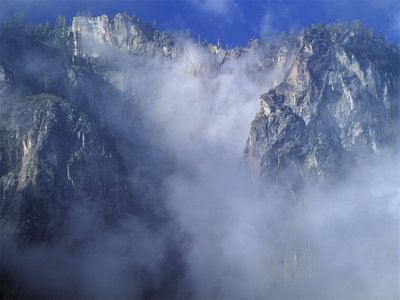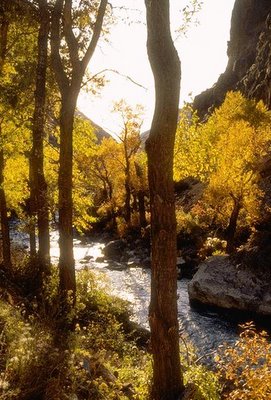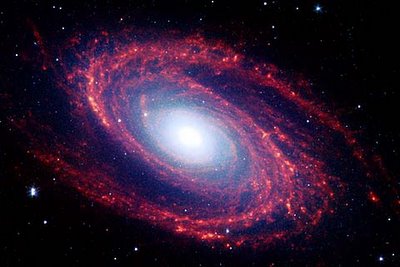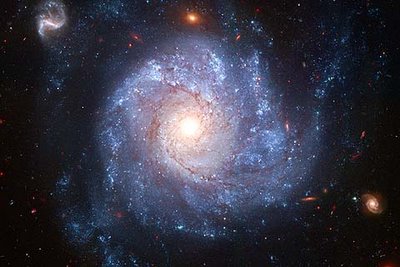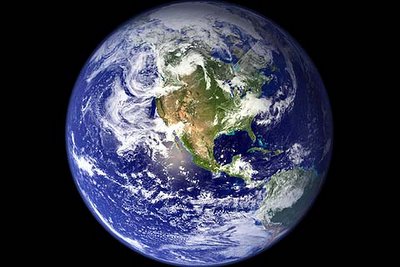 The first card in the major arcana is The Magician. This card is generally pictured as a man in white wearing a red robe and holding a wand in the right hand, which points to the sky, while the left hand points to the ground. There are various symbols scattered on a table in front of the Magician, including the four elements represented in the minor arcana--wands/fire, cups/water, swords/air, and pentacles or coins/earth). Older versions of the card often have the Magician dressed in colorful outfits, usually featuring purple to denote some connection to royalty.
The first card in the major arcana is The Magician. This card is generally pictured as a man in white wearing a red robe and holding a wand in the right hand, which points to the sky, while the left hand points to the ground. There are various symbols scattered on a table in front of the Magician, including the four elements represented in the minor arcana--wands/fire, cups/water, swords/air, and pentacles or coins/earth). Older versions of the card often have the Magician dressed in colorful outfits, usually featuring purple to denote some connection to royalty.Most of the common interpretations of this card rely on its supposed representation of magic and/or alchemy--the transmutation of matter into Spirit. The transmutation aspect is on the right track.
I choose to see the Magician as symbolic of the creative impulse inherent in the psyche of all beings.
[T]he Magician can initiate the process of self-realization which Jung called individuation, and he can guide our journey into the underworld of our deepest selves (Nichols, Jung and the Tarot).This impulse toward individuation is present from the moment we enter the world, so it is fitting that the Magician is the first step into physicality for the Fool as s/he makes the journey to wholeness.
It is equally important to note that the Magician, as an archetype, exists in a realm outside of the divisions of time, space, body, and soul--what Jung called the psychoid. Jung, in his later writings, argued that the archetypes are not merely instinctual, but rather that they are psychoid, that is, "they shape matter (nature) as well as mind (psyche)" (Houston Smith, Forgotten Truth, 40).
The infant also exists in a space that is devoid of the distinctions of time, matter, and space: prepersonal, prerational, pre-egoic, and undifferentiated. The creative impulse that sets into motion the whole grand cycle of development through the human Spiral is still only a potential just beginning to emerge through the manifestation of Spirit as a child.
In its "negative" aspect, the Magician represents the process that creates the "ten thousand things" that distract us from the truth that all things are one. The Magician, through his/her gift of deception, creates maya, the illusion that Buddhism calls samsara. Once we emerge from the "ground of being," we are launched on the journey to find our way to that same ground again, but this time as a whole person who has transcended the ego and attained "enlightenment."
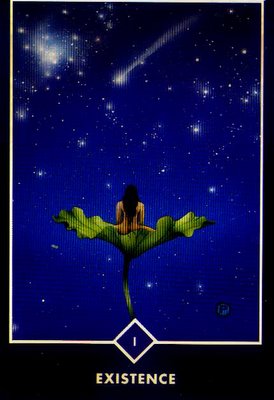 The Osho Zen Tarot calls this card "Existence," which I feel is the most fitting interpretation of the energy of the Magician archetype:
The Osho Zen Tarot calls this card "Existence," which I feel is the most fitting interpretation of the energy of the Magician archetype:The stars, the rocks, the trees, the flowers, fish and birds - all are our brothers and sisters in this dance of life. We human beings tend to forget this, as we pursue our own private agendas and believe we must fight to get what we need. But ultimately, our sense of separateness is just an illusion, manufactured by the narrow preoccupations of the mind.Illusion or not, once we become embodied in this world (represented by the four elements in the traditional card), we must work to transcend the limited mind that is tricked by the Magician into seeing all things as separate.
The Magician is best understood as an energetic presence in our lives, an impetus pushing us to transcend limitations, to see through the magic of ego consciousness that blinds us to our true nature.
The card may also be read as symbolic of our incarnate paradox: we are timeless, nondual manifestations of Spirit, yet we are discrete bodies seemingly locked into time and space. [In this sense, the Magician, like the Fool, also functions as a trickster in that s/he blinds us to the nature of reality with his sleight of hand.] The Magician suggests we are both things and neither (since all of it is an illusion).
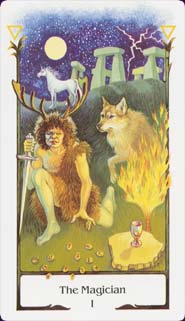 One final note: many modern decks portray the Magician as either a shaman or a Christ figure. I once felt strongly that the card was shamanic in its energy, but I no longer adhere to that position. If one simply sees the card as representative of the "ceremonial magic" tradition in Western culture, the shamanic reading is appropriate.
One final note: many modern decks portray the Magician as either a shaman or a Christ figure. I once felt strongly that the card was shamanic in its energy, but I no longer adhere to that position. If one simply sees the card as representative of the "ceremonial magic" tradition in Western culture, the shamanic reading is appropriate.I think there is more to the Christ portrayal, considering Jesus as a manifestation of the divine creative impulse, but I still feel the card is more of an energetic archetype than a religious archetype.
However we choose to read the card, the Magician will likely remain the most popular of the Tarot images. We have always been fascinated by magic--and the magic of our human evolution is at the heart of this image.

